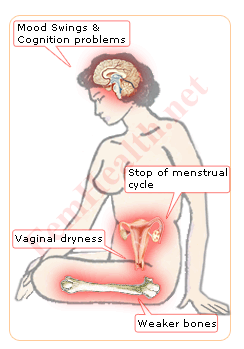Estrogen hormones have several functions in the female body. Besides controlling the menstrual cycle and sexual development, estrogen has very large and diverse effects on the central nervous system.
For instance, studies have shown that estrogen help nerve cells communicate in the hippocampus, a part of the brain involved in memory. That suggests the microstructure in the brain changes in response to estrogen.

During midlife, women bodies naturally loss the ability to maintain estrogen amounts in balance. As a result, women start experiencing several physical changes, which are commonly known as menopause symptoms. The most widely menopause symptoms are hot flashes, mood swings and loss of libido. But also, some women experience cognition changes: women frequently complain about problems with attention and concentration, and increased forgetfulness.
Look at the picture on the right to see estrogen declination effects.
Recently, a group of researchers from Yale University, led by Dr. Sally Shaywitz M.D., prepared a study to test the effect of estrogen in cognition. Knowing that menopausal women have low estrogen levels, they wanted to find out if incrementing estrogen levels would help her improve their cognition.
To achieve this, they used functional magnetic resonance imaging to study the influence of estrogen on women's brain activation patterns during tasks involving verbal and nonverbal working memory.
Forty-six postmenopausal women (aged 33 to 61 years) were treated with either estrogen or placebo in a randomized, double-blind, placebo-controlled, crossover trial from 1996 through 1998.
The study confirmed that estrogen intake improves brain activation patterns [in specific brain regions] in menopausal women as they perform working memory tasks. These data suggest that it may be possible to affect functional brain organization in older women; these alterations in brain activation patterns in subjects taking estrogen suggest functional plasticity of memory systems in mature women.
"This study opens the door to future research of mental functioning in midlife women. Brain circuitry can be changed. Midlife is apparently a time of great brain plasticity. The brain can rewire!" Dr. Shaywitz declares in an interview. The evidence is mounting that estrogen therapy can improve the daily life of many women. However, this is a complex issue and must be made on a highly individual basis. See your doctor about what you may be able to do to improve yours.
